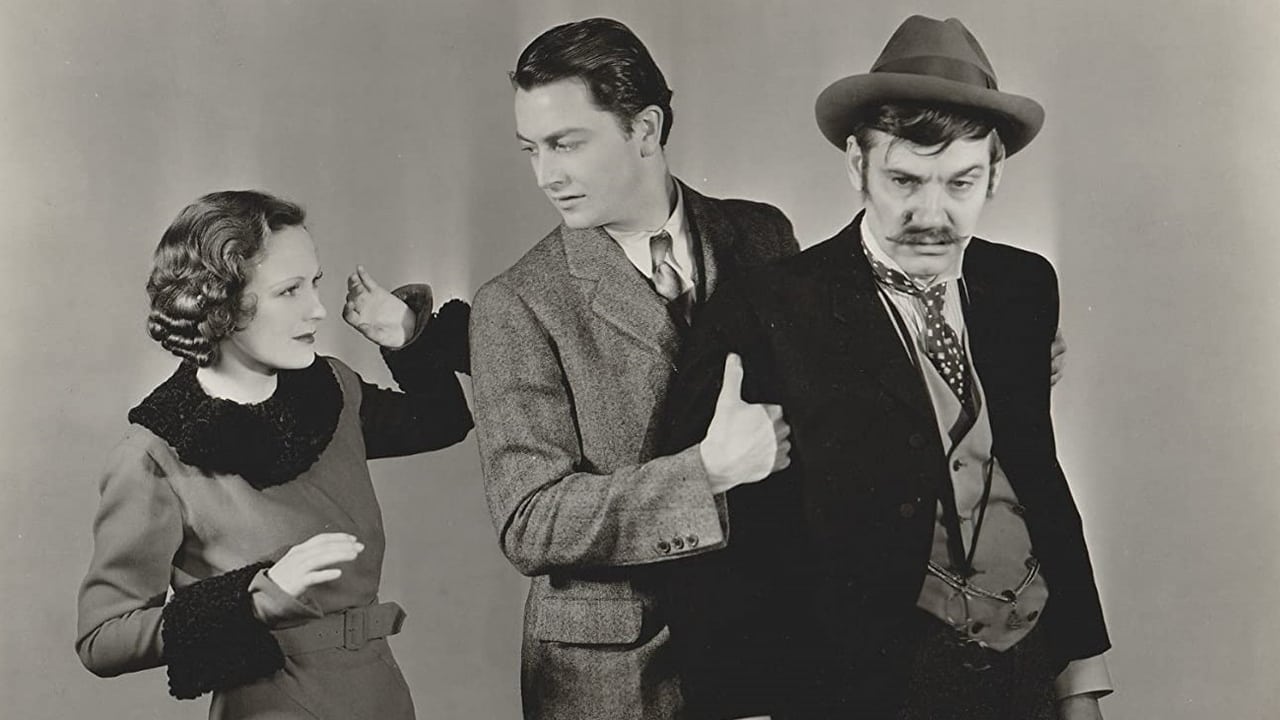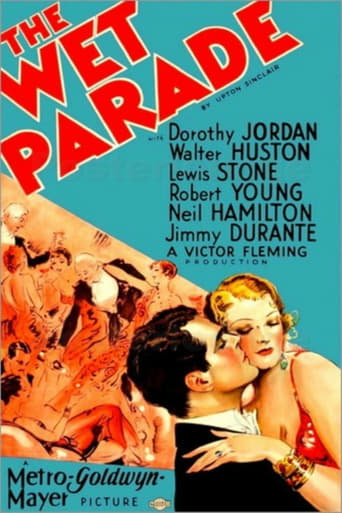

It's difficult to find old movies that I haven't already seen, so it was with great anticipation that I watched The Wet Parade, 1932, for the first time. It was like taking a vicarious time machine journey that landed smack in the middle of one of America's less memorable self-righteous escapades: The Prohibition. The best part is that this intensely dramatic flick was made a full year before prohibition ended, so the full flavor of the alcohol-soaked theme really hits home. It includes some historically accurate details, which were still very fresh in everyone's minds when the movie was produced. It also depicts some of the darker details of desolation and desperation the general public wrestled with after losing complete access to drinkable alcohol. Walter Huston, one of Hollywood's most convincing actors of his era, outdoes himself in this movie. Young Robert Young is quite dashing in his role, although the sight of him paired up with the gregarious Jimmy Durante might prompt a quick reality check if you're not prepared for this early "odd couple" concept.
... View MoreThis was obviously a stellar production from MGM, designed to showcase it's roster of young up and coming stars. Dorothy Jordan had been around since 1930 and she was pretty and sweet and had played enough waifs, kid sisters and even Latin ladies to be considered for the lead. Playing opposite her was a young actor who MGM was grooming - Robert Young. Myrna Loy (in a pretty thankless role), Joan Marsh, Wallace Ford and Neil Hamilton rounded out the cast and they were ably helped by two stage and screen veterans - Lewis Stone and Walter Huston. Taken from a book by social commentator novelist Upton Sinclair, it tried to show how Prohibition was the cure that was worse than the disease. The story tells of two families, the Chilicotes from the South and the Tarletons from the North and how their lives are affected by drink.Sweet "Persimmon" Chilicote (Dorothy Jordan) is determined to keep her distinguished father (Lewis Stone) away from the booze that is turning him into the town laughing stock. When, in a fit of the D.Ts., he leaps to his death Persimmon makes an impassioned speech to her father's "friends" that she would love to see the day when alcohol is poured into the gutters (shades of Prohibition).Little does she realise that her brother, budding playwright Roger (Neil Hamilton) is following in their father's footsteps. He is staying up North at a friend Kip Tarleton's (Robert Young) hotel. Kip is in the same boat as Persimmon, his father's alcoholism is tearing the family apart. Tarleton Snr. (a madly overacting Walter Huston) is a political campaigner for the Democrats, who believes Wilson will not only keep them out of the War but also vote against Prohibition as well. He is wrong on both counts as America goes to War and the Pure Food Act is signed, signalling the start of Prohibition. I think the movie strives to put across that Prohibition wasn't the answer, that people who had been seasoned drinkers before were now at the mercy of unscrupulous bootleggers, whose toxic additives to the brew eg methylated spirits, were, in some cases, sending some drinkers insane. There is a telling scene that shows the true meaning of the phrase "Bonded in Canada". From the time the poisonous menthol is poured into bottles, to the phoney Canadian bags that are doused in water, then rubbed in sand to make them look authentic, it is a real eyeopener!!!Kip sees his father kill his mother (Clara Blandick) while under the influence of bootleg liquor and is inspired to become a Federal Agent - he has already met Persimmon and she encourages him in his determination. His partner is played by Jimmy Durante - "I've got a million of them"!! - whose presence really lightens the movie. Neil Hamilton is also a cut above his part as he espouses "War has no right side" and cynical remarks about prohibition. Every alcoholic cliché is thrown in, including the one about drinking bad whiskey will make you go blind - that happens to Roger and sends callous Eileen (Myrna Loy) running from the building. A big plus, for me, in this movie is that neither Jordan nor Young deviate from their "right" paths. Young's Kip has so many opportunities, even his boss (played by John Miljan) almost throws in the towel and thinks of joining the "baddies". MGM found in Young an all purpose leading man and his career didn't vary, until he did a handful of Noirs at the end of the 40s. Funnily enough, in the 50s, he confessed to being an alcoholic but had sought help.Highly Recommended.
... View MoreThis is an oddity but it says volumes about the evils of both drink and prohibition. There is great harm done by liquor, but almost greater harm brought about by the prohibition. With frightening details of how the boot leg liquor was made, it's a wonder more people did not die from bad booze. My mother actually knew someone who went blind from bad liquor. The acting is above and beyond the call of the script, which is really what kept me engaged- especially if you can get past the first twenty minutes. Robert Young gives a standout performance and if he doesn't break your heart, you probably never had a heart to break to begin with. Packed with stars for all movie buffs to spot including Myrna Loy. And all MST3K fans will recognize John Miljan from episode #507 "I Accuse My Parents". Worth a viewing for a peek into the social dilemma of 1920-1933.
... View MoreVictor Fleming's "The Wet Parade" (1932) would be an appropriate double feature companion to "Reefer Madness". But while it shares that film's exaggerated (insert hysteria here) style, it is a much higher budget production and ultimately delivers a balanced and well- reasoned message.It also has an all-star cast, although many of them are very early in their careers. The story centers around an old southern family, the Chilcotes; Lewis Stone, Dorothy Jordan, and Neil Hamilton (Commissioner Gordon on television's "Batman" series). Other name actors included Walter Huston, Robert Young, and Myrna Loy, Wallace Ford, and Jimmy Durante.The film is almost an epic as it covers a 15-year span from 1916 to 1931. During WWI Congress expands federal regulation with a wartime measure called the Food Control Act (regulating grain among other things). This leads to the ill-advised Volsted Act and the 18th Amendment outlawing liquor (insert nationwide "Prohibition"). But prohibition curtails only legal drinking, and gives criminal elements a huge base of potential customers. Although much of the demand is met by smuggling (especially from Canada) and domestic distillation, there is quick money to be made with bogus product. Criminals simply take bulk denaturated (meaning unfit to drink) cleaning fluid ( a mix of ethyl alcohol and methanol) and package it as a name brand product. The film shows an excellent sequence of this process.The film also shows the consequences of consuming this product; blindness or death. The intention of the film is not to promote drinking but to illustrate a bigger evil, the unintended consequences of the government's ill-advised attempt to prohibit the activity. "The Wet Parade" was a rare example of mainstream Hollywood's willingness to openly take a side in a political issue. In doing so they risked alienating a huge potential audience (the President had vetoed the original legislation and it took legions of pietistic voters to pass the 18th Amendment). The effectiveness of the "The Wet Parade" message no doubt contributed to the passage of the 21st Amendment the following year (1933), which repealed nationwide prohibition. Then again, what do I know? I'm only a child.
... View More